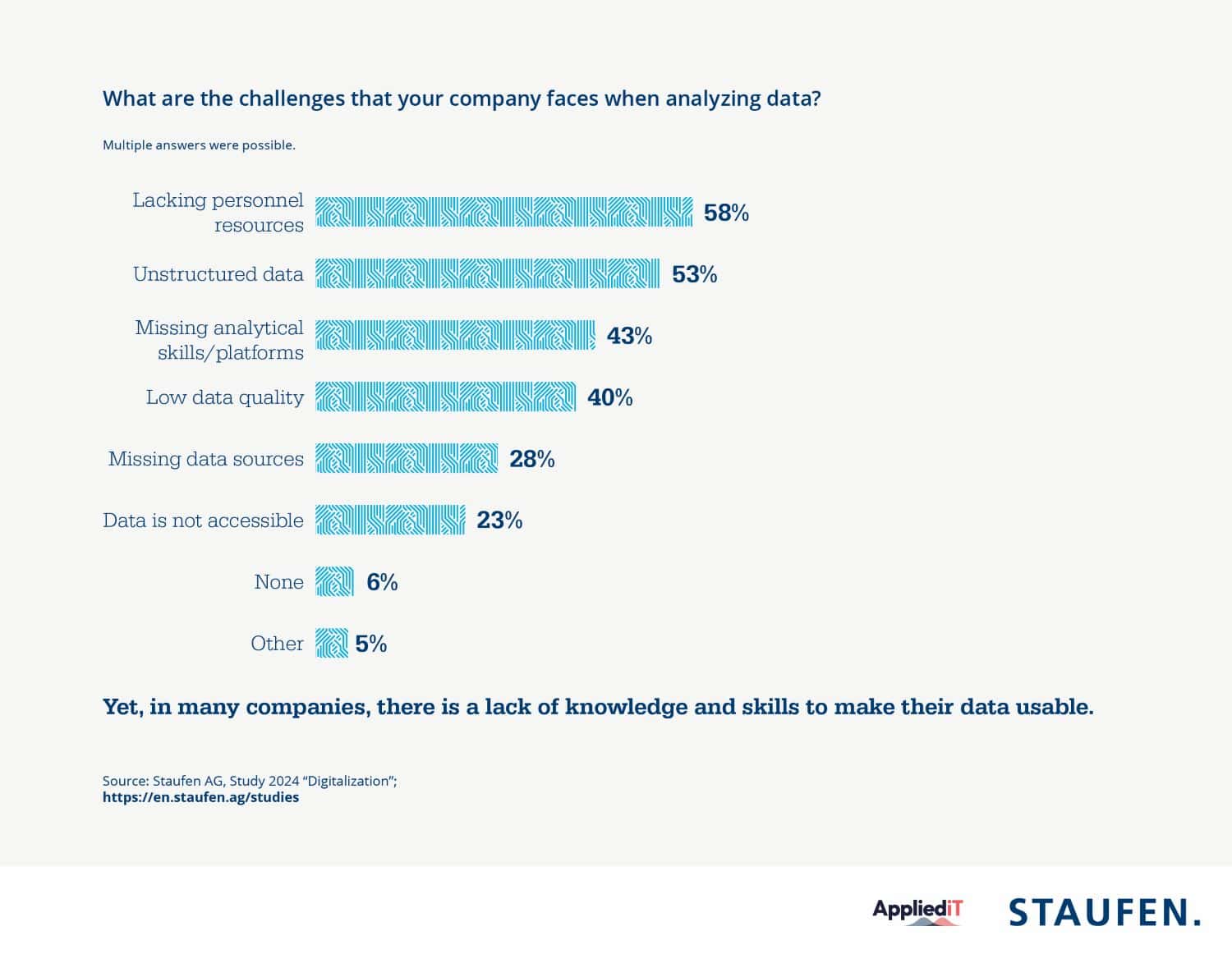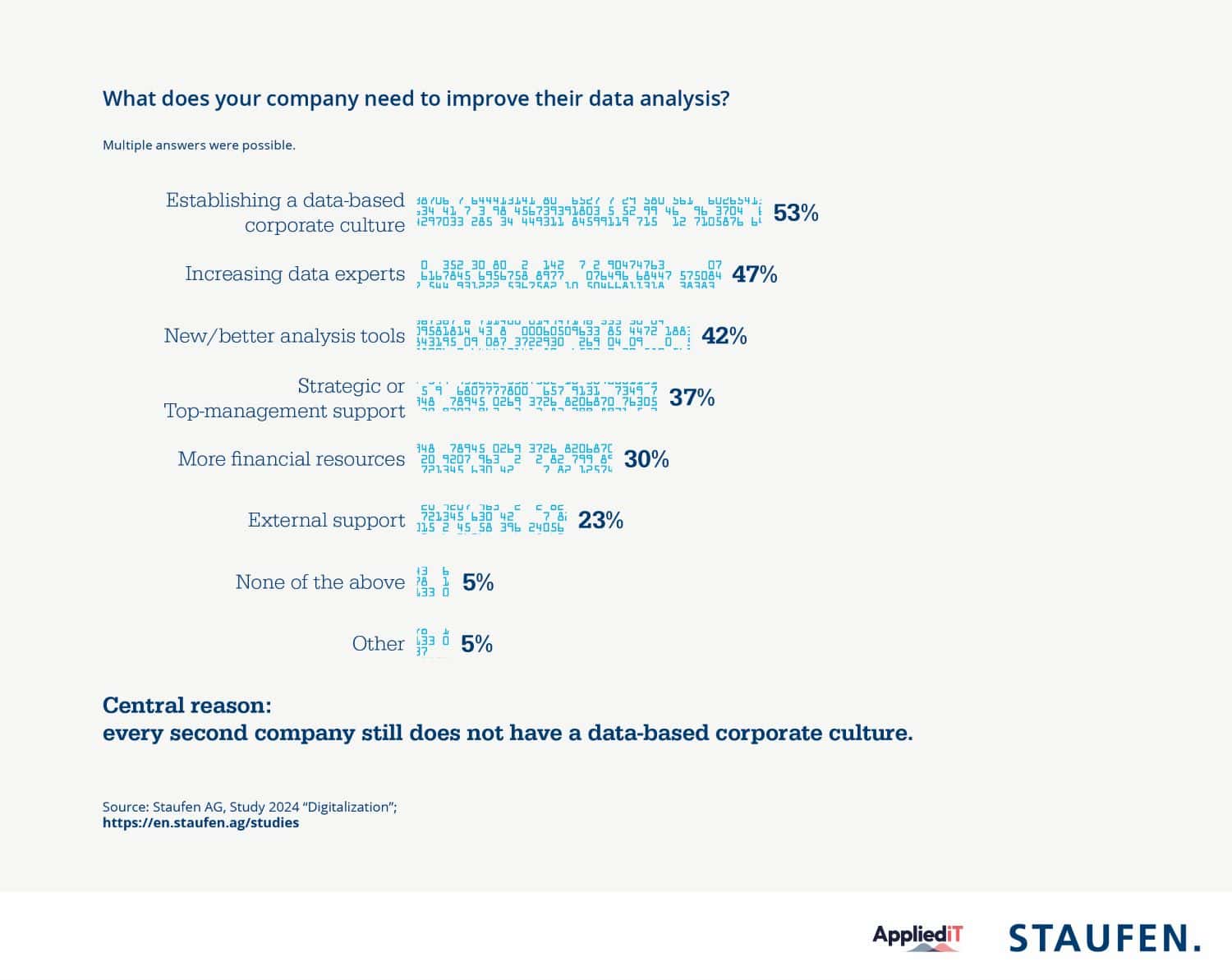
According to the latest study “Digitalization 2024”, six out of ten industrial companies in the German-speaking region of Germany, Austria, and Switzerland lament the lack of professionals capable of fully exploiting the potential lying dormant in their data. Failing to analyze data is wasting a lot of potential for added value. In addition, more than half of the companies find it difficult to implement the findings acquired from the data into practice. For the study, the Staufen management consultants and AppliediT, a specialist for the real-time analysis of industrial data, surveyed more than 400 industrial companies in Germany, Austria, and Switzerland.
Imagine you have data and no one is using it. This is the sad reality in too many companies
Dr. Michael Feldmeth, Head of the Digital & Industry 4.0 Practice Unit at Staufen
Where in fact, industrial companies urgently need to leverage efficiency and business potential right now. “Companies are still confusing data analysis with a static snapshot. What this means: companies do know how well a machine is being used at a specific point in time. Still, what would be more important would be to learn which dependencies and variables along the value creation process impact the specific machine output. However, these analysis activities are often neglected,” says Feldmeth, the digitalization expert.
Respondents to the “Digitalization 2024” study stated that the reason why many companies still do not conduct in-depth data analysis is primarily due to a “Lack of human resources” (58%). Yet “Unstructured data” (53 percent) and “A lack of analytical skills or platforms” (43 percent) impede the crucial need to gain new insights.
Data orientation must become a part of the corporate culture
Feldmeth also observes: “Generating knowledge is only one side of the coin. Applying it is just as important. This is also where things go wrong in may production halls. Indeed, even after the data has been analyzed, it is often difficult to transfer it into practical applications.” According to the study, 59% of companies struggle to translate the findings from a data analysis into operational measures.
When asked about which measures are necessary to improve the data analysis, 53% of the respondents state “Establishing a corporate culture focused on data.” This is followed by topics such as “Recruiting more data experts (47%) and “New or improved analysis tools” (42%).
Only knowledge of the interconnections ignites the data engine
“While awareness of the economic importance and entrepreneurial potential of the information world has increased, the subject is still treated too superficially. A change in thinking must take place at all levels”, says Ignacio Quiñonero Ferrer, CEO of AppliediT.
In his opinion, companies can benefit from improved data analysis in all areas, from Purchasing to R&D and Production, to product tracking or refinishing: “Having the knowledge of the interconnections between each of the components or processing steps enables the company to not only identify individual problem areas with pinpoint accuracy, but to also determine the most important levers. This is because even the smallest adjustments early within value creation can sometimes already have huge effects at the end of the chain. And yet, it is only with a professional analysis that these interdependencies can be uncovered.”

Ignacio Quiñonero Ferrer
Managing Director
AppliediT S.L.


About the “Digitalization Study 2024”
For the “Digitalization 2024” study, Staufen AG and AppliediT surveyed 417 industrial companies in Germany, Austria and Switzerland. You can request a copy of the complete study results here:
You might also be interested in

Success factor digitalization: Increased resilience and sustainability in the supply chain network
In today’s volatile world, the resilience and sustainability of supply chain networks are more critical than ever. At the BestPractice Day 2023 convention, industry experts discussed how digitalization and collaboration are key factors in achieving these goals.
Read more
Study Digitalization
The Staufen study “Digitalization 2024” shows how difficult it is to exploit the full potential of data. The study underlines the need for a data-driven strategy and professional data analysis and points to a lack of expertise, resources and a data-centric corporate culture.
Read more

